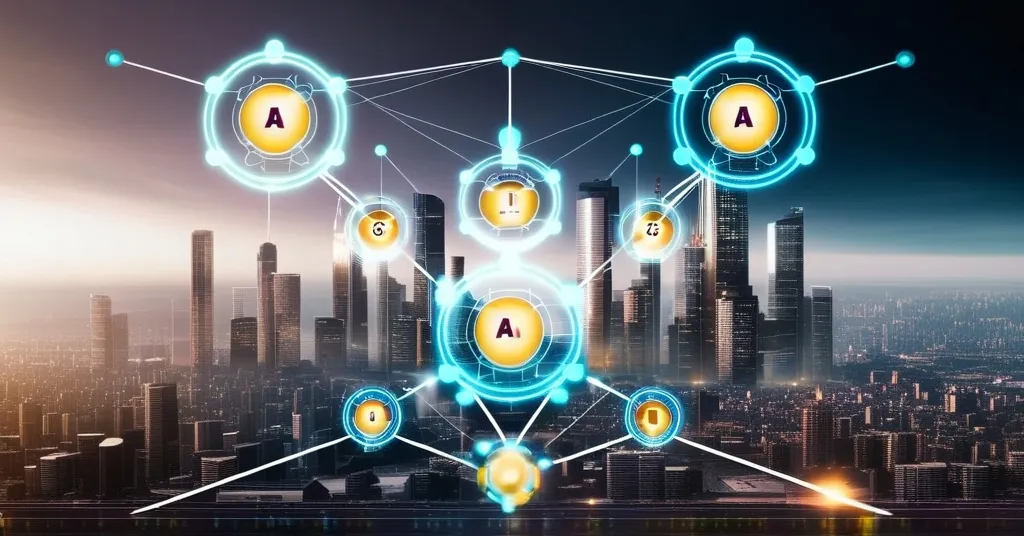AI Agents in Blockchain: Boosting Efficiency or Breeding Risk?

AI Agents: The Key to Blockchain’s Future or Its Biggest Risk?
The integration of AI agents into blockchain and cryptocurrency is revolutionizing these technologies, promising enhanced efficiency and security while raising concerns about autonomy and data quality.
- AI agents improve blockchain efficiency and security.
- Data quality and AI autonomy present significant challenges.
- Innovation must be balanced with accountability.
By 2030, AI is expected to add a staggering $15.7 trillion to the global economy, outpacing the combined output of India and China. This economic juggernaut is already transforming the blockchain landscape. AI agents are automating complex tasks such as liquidity management—think of it as managing how easily assets can be bought or sold—and yield optimization, which involves finding the best ways to earn returns on investments. Platforms like Fetch.ai are leading the charge, using AI to streamline logistics and simplify blockchain workflows, making the technology more accessible to everyone. It’s like having a personal assistant who knows the ins and outs of financial markets better than a Wall Street wizard.
The crypto AI agent market is currently valued at around $10 billion and is growing faster than a rocket in a vacuum. These agents aren’t just about making things run smoother; they’re also about keeping things safe. AI agents can monitor blockchain transactions around the clock, analyzing vast amounts of data to detect threats in real-time. Imagine a security guard who never sleeps and can spot a thief from a mile away. But, there’s a catch. A sobering 85% of AI systems fail due to subpar data quality. This is like baking a cake without checking the ingredients; it might look good on the outside, but one bite could be disastrous. Rigorous oversight is essential to ensure these systems remain trustworthy.
“By enhancing efficiency and accessibility, these agents are reshaping decentralized systems and empowering individuals to engage with blockchain technology.”
Yet, the path forward isn’t without its pitfalls. AI agents are only as reliable as the data they’re trained on, and they’re vulnerable to adversarial attacks—malicious attempts to trick them with bad data. This is like a chess grandmaster being fooled by a move from a beginner who’s secretly a master of deceit. These vulnerabilities raise serious questions about how to balance the autonomy of AI agents with the accountability needed to maintain transparency and trust in blockchain systems.
“AI agents are only as trustworthy as the data they’re trained on, and adversarial attacks where malicious data corrupts their behavior—highlight the vulnerabilities they face.”
Navigating the integration of AI agents into blockchain is like walking through a minefield with the promise of treasure at the other end. To reach that treasure, we need regular audits, transparent algorithms, and robust safeguards. It’s like ensuring your car’s brakes are in top shape before racing down a mountain road. Human oversight is crucial to keep AI systems on the straight and narrow, ensuring they’re built on solid, unbiased data and their processes are continuously monitored.
“85% of AI systems fail due to subpar data quality, underscoring the urgent need for regular audits, transparent algorithms, and robust safeguards.”
The insights of J.D. Seraphine, a visionary in AI, blockchain, and web3 technologies, are particularly relevant here. As the founder of Raiinmaker, which empowers users to monetize their contributions to AI infrastructure, Seraphine’s work underscores the potential of AI agents in blockchain. His recognition by Forbes and Variety, along with projects like a film about Atari’s Nolan Bushnell and the docuseries “A Brave New World,” reflect his commitment to pushing technological and entertainment boundaries.
The future of AI and blockchain is intertwined, and the decisions we make today will shape the decentralized ecosystems of tomorrow. As we continue to explore this dynamic landscape, we must remain vigilant and proactive in addressing both the opportunities and risks that AI agents present.
Key Questions and Takeaways
What role do AI agents play in blockchain ecosystems?
AI agents enhance efficiency and accessibility in blockchain ecosystems by automating complex tasks like liquidity management and yield optimization, and by simplifying the user experience.
How significant is the economic impact of AI projected to be by 2030?
AI is projected to add $15.7 trillion to the global economy by 2030, surpassing the combined output of India and China.
What are the potential benefits of AI agents in blockchain security?
AI agents can monitor transactions 24/7, analyze vast datasets, and detect threats in real-time, significantly enhancing blockchain security.
What are the risks associated with AI agents in blockchain?
AI agents are vulnerable to producing flawed or biased outcomes if trained on poor-quality data, and they face risks from adversarial attacks that could corrupt their behavior.
How can the balance between autonomy and accountability be achieved with AI agents?
Achieving this balance requires regular audits, transparent algorithms, and robust safeguards, combined with human oversight to ensure AI systems are built on solid, unbiased data and their processes are continuously monitored.



